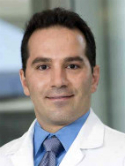Polyclonal immunoglobulin recovery in patients with newly diagnosed myeloma receiving maintenance therapy after autologous haematopoietic stem cell transplantation with either carfilzomib, lenalidomide and dexamethasone or lenalidomide alone: Subanalysis of the randomized phase 3 ATLAS trial Journal Article
| Authors: | Kubicki, T.; Dytfeld, D.; Wróbel, T.; Jamroziak, K.; Robak, P.; Czyż, J.; Tyczyńska, A.; Druzd-Sitek, A.; Giannopoulos, K.; Szczepaniak, T.; Łojko-Dankowska, A.; Matuszak, M.; Gil, L.; Puła, B.; Rybka, J.; Majcherek, M.; Usnarska-Zubkiewicz, L.; Szukalski, Ł; Zaucha, J. M.; Mikulski, D.; Czabak, O.; Lahoud, O. B.; Stefka, A.; Derman, B. A.; Jakubowiak, A. J. |
| Article Title: | Polyclonal immunoglobulin recovery in patients with newly diagnosed myeloma receiving maintenance therapy after autologous haematopoietic stem cell transplantation with either carfilzomib, lenalidomide and dexamethasone or lenalidomide alone: Subanalysis of the randomized phase 3 ATLAS trial |
| Abstract: | Previous studies suggest that postautologous stem cell transplant (ASCT) recovery of polyclonal immunoglobulin from immunoparesis in patients with multiple myeloma is a positive prognostic marker. We performed a longitudinal analysis of polyclonal immunoglobulin concentrations and unique B-cell sequences in patients enrolled in the phase 3 ATLAS trial that randomized 180 subjects to either carfilzomib, lenalidomide, dexamethasone (KRd) or lenalidomide (R) maintenance. In the KRd arm, standard-risk patients with minimal residual disease negativity after six cycles de-escalated to R alone after cycle 8. One year from the initiation of maintenance at least partial recovery of polyclonal immunoglobulin was observed in more patients on the R arm (58/66, p < 0.001) and in those who de-escalated from KRd to R (27/38, p < 0.001) compared to the KRd arm (9/36). In patients who switched from KRd to R, the concentrations of uninvolved immunoglobulin and the number of B-cell unique sequences increased over time, approaching values observed in the R arm. There were no differences in progression-free survival between the patients with at least partial immunoglobulin recovery and the remaining population. Our analysis indicates that patients receiving continuous therapy after ASCT experience prolonged immunoparesis, limiting prognostic significance of polyclonal immunoglobulin recovery in this setting. © 2023 The Authors. British Journal of Haematology published by British Society for Haematology and John Wiley & Sons Ltd. |
| Keywords: | adult; controlled study; treatment response; middle aged; survival analysis; major clinical study; overall survival; lenalidomide; clinical trial; cancer staging; antineoplastic agent; prospective study; progression free survival; multiple cycle treatment; multiple myeloma; randomized controlled trial; antineoplastic combined chemotherapy protocols; maintenance therapy; dexamethasone; hematopoietic stem cell transplantation; risk factor; minimal residual disease; open study; phase 3 clinical trial; transplantation, autologous; autologous hematopoietic stem cell transplantation; myeloma; longitudinal study; carfilzomib; maintenance; atlas; autotransplantation; valaciclovir; cancer prognosis; humans; human; male; female; article; immunoparesis |
| Journal Title: | British Journal of Haematology |
| Volume: | 203 |
| Issue: | 5 |
| ISSN: | 0007-1048 |
| Publisher: | John Wiley & Sons |
| Date Published: | 2023-12-01 |
| Start Page: | 792 |
| End Page: | 802 |
| Language: | English |
| DOI: | 10.1111/bjh.19097 |
| PUBMED: | 37691005 |
| PROVIDER: | scopus |
| DOI/URL: | |
| Notes: | Article -- Source: Scopus |



